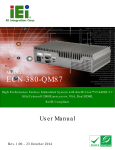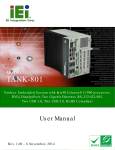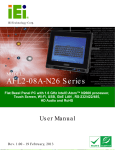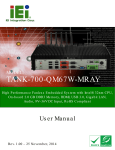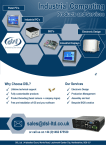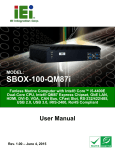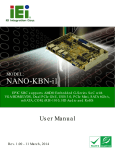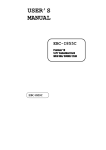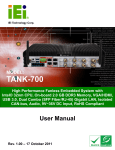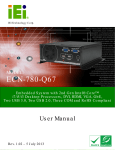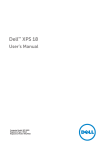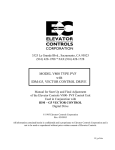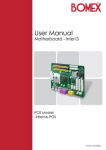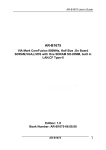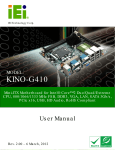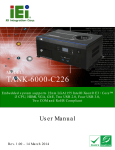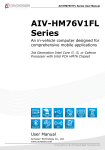Download TANK-760 Embedded System
Transcript
TANK-760 Em b e d de d S ys te m MODEL: TANK-760 Hig h P e rfo rm a n c e Fa n le s s Em b e d d e d S ys te m with In te l® Co re i5-4400E/ Ce le ro n 2000E p ro c e s s o r, VGA, HDMI, Dis p la yP o rt, 9-36V DC in p u t a n d Ro HS Co m p lia n t Us e r Ma n u a l Page i Re v. 1.01 – 5 De c e m b e r 2014 TANK-760 Em b e d d e d S ys te m Re vis io n Date Version Changes 5 December, 2014 1.01 Update Section 3.7.4: CAN-bus Terminal Blocks Pinouts 22 August, 2014 1.00 Initial release P a g e ii TANK-760 Em b e d de d S ys te m Co p yrig h t COP YRIGHT NOTICE The information in this document is subject to change without prior notice in order to improve reliability, design and function and does not represent a commitment on the part of the manufacturer. In no event will the manufacturer be liable for direct, indirect, special, incidental, or consequential damages arising out of the use or inability to use the product or documentation, even if advised of the possibility of such damages. This document contains proprietary information protected by copyright. All rights are reserved. No part of this manual may be reproduced by any mechanical, electronic, or other means in any form without prior written permission of the manufacturer. TRADEMARKS All registered trademarks and product names mentioned herein are used for identification purposes only and may be trademarks and/or registered trademarks of their respective owners. P a g e iii TANK-760 Em b e d d e d S ys te m Ta b le o f Co n te n ts 1 INTRODUCTION.......................................................................................................... 1 1.1 OVERVIEW.................................................................................................................. 2 1.2 MODEL VARIATIONS ................................................................................................... 2 1.3 FEATURES ................................................................................................................... 2 1.4 TECHNICAL SPECIFICATIONS ...................................................................................... 3 1.5 CONNECTOR PANEL .................................................................................................... 5 1.5.1 Front Panel ........................................................................................................ 5 1.5.2 Rear Panel ......................................................................................................... 6 1.6 LED INDICATORS ....................................................................................................... 8 1.7 DIMENSIONS ............................................................................................................... 9 2 UNPACKING ............................................................................................................... 10 2.1 ANTI-STATIC PRECAUTIONS .......................................................................................11 2.2 UNPACKING PRECAUTIONS ........................................................................................11 2.3 UNPACKING CHECKLIST ........................................................................................... 12 3 INSTALLATION ......................................................................................................... 14 3.1 INSTALLATION PRECAUTIONS ................................................................................... 15 3.2 HARD DISK DRIVE (HDD) INSTALLATION ................................................................ 15 3.3 SO-DIMM INSTALLATION ....................................................................................... 18 3.4 PLUGGABLE DC-IN TERMINAL BLOCK INSTALLATION ............................................. 19 3.5 FOOT PAD INSTALLATION ......................................................................................... 20 3.6 MOUNTING THE SYSTEM WITH MOUNTING BRACKETS ............................................ 21 3.7 EXTERNAL PERIPHERAL INTERFACE CONNECTORS ................................................... 22 3.7.1 ACC Mode Switch ............................................................................................ 23 3.7.2 AT/ATX Power Mode Switch ............................................................................ 23 3.7.3 Audio Connector .............................................................................................. 24 3.7.4 CAN-bus Terminal Blocks ................................................................................ 24 3.7.5 Digital I/O Connector ...................................................................................... 25 3.7.6 HDMI Connector ............................................................................................. 25 3.7.7 LAN Connectors ............................................................................................... 26 P a g e iv TANK-760 Em b e d de d S ys te m 3.7.8 Power Input, 4-pin Terminal Block .................................................................. 28 3.7.1 Power Input, 4-pin DIN Connector ................................................................. 28 3.7.2 RS-232 Serial Port Connectors ........................................................................ 29 3.7.3 RS-232/422/485 Serial Port Connectors ......................................................... 31 3.7.4 USB Connectors ............................................................................................... 32 3.7.5 VGA Connector ................................................................................................ 33 3.8 POWERING ON/OFF THE SYSTEM ............................................................................. 35 4 BIOS .............................................................................................................................. 36 4.1 INTRODUCTION......................................................................................................... 37 4.1.1 Starting Setup ................................................................................................... 37 4.1.2 Using Setup ...................................................................................................... 37 4.1.3 Getting Help ..................................................................................................... 38 4.1.4 Unable to Reboot after Configuration Changes .............................................. 38 4.1.5 BIOS Menu Bar ................................................................................................ 38 4.2 MAIN ........................................................................................................................ 40 4.3 ADVANCED ............................................................................................................... 41 4.3.1 ACPI Settings ................................................................................................... 42 4.3.2 RTC Wake Settings ........................................................................................... 43 4.3.3 CPU Configuration .......................................................................................... 45 4.3.4 SATA Configuration ......................................................................................... 47 4.3.5 Intel(R) Rapid Start Technology ....................................................................... 48 4.3.6 USB Configuration........................................................................................... 49 4.3.7 F81866 Super IO Configuration ...................................................................... 50 4.3.7.1 Serial Port n Configuration ....................................................................... 51 4.3.8 F81866 H/W Monitor ....................................................................................... 56 4.3.9 Serial Port Console Redirection ...................................................................... 56 4.3.10 iEi Feature ..................................................................................................... 60 4.4 CHIPSET ................................................................................................................... 61 4.4.1 PCH-IO Configuration .................................................................................... 62 4.4.1.1 PCH Azalia Configuration ........................................................................ 63 4.4.2 System Agent (SA) Configuration .................................................................... 64 4.4.2.1 Graphics Configuration ............................................................................. 64 4.4.2.2 Memory Configuration ............................................................................. 67 4.5 BOOT........................................................................................................................ 68 Page v TANK-760 Em b e d d e d S ys te m 4.6 SECURITY ................................................................................................................. 70 4.7 SAVE & EXIT ............................................................................................................ 71 A SAFETY PRECAUTIONS ......................................................................................... 72 A.1 SAFETY PRECAUTIONS ............................................................................................ 73 A.1.1 General Safety Precautions ............................................................................. 73 A.1.2 Anti-static Precautions .................................................................................... 73 A.1.3 Product Disposal ............................................................................................. 74 A.2 MAINTENANCE AND CLEANING PRECAUTIONS ........................................................ 75 A.2.1 Maintenance and Cleaning.............................................................................. 75 A.2.2 Cleaning Tools ................................................................................................. 75 B HAZARDOUS MATERIALS DISCLOSURE ......................................................... 77 B.1 HAZARDOUS MATERIALS DISCLOSURE TABLE FOR IPB PRODUCTS CERTIFIED AS ROHS COMPLIANT UNDER 2002/95/EC WITHOUT MERCURY ....................................... 78 P a g e vi TANK-760 Em b e d de d S ys te m Lis t o f Fig u re s Figure 1-1: TANK-760 .....................................................................................................................2 Figure 1-2: TANK-760 Front Panel ................................................................................................6 Figure 1-3: TANK-760 Rear Panel .................................................................................................7 Figure 1-4: TANK-760 LED Indicators...........................................................................................8 Figure 1-5: Physical Dimensions (mm) ........................................................................................9 Figure 3-1: Bottom Panel Retention Screws ..............................................................................16 Figure 3-2: HDD Bracket Retention Screws ...............................................................................16 Figure 3-3: HDD Installation ........................................................................................................17 Figure 3-4: HDD Retention Screws .............................................................................................17 Figure 3-5: SO-DIMM Socket .......................................................................................................18 Figure 3-6: SO-DIMM Installation ................................................................................................19 Figure 3-7: Pluggable DC-in Terminal Block Installation .........................................................20 Figure 3-8: Foot Pad Installation .................................................................................................21 Figure 3-9: Mounting Bracket Retention Screws ......................................................................21 Figure 3-10: ACC Mode Switch ...................................................................................................23 Figure 3-11: AT/ATX Power Mode Switch ..................................................................................23 Figure 3-12: Audio Connector .....................................................................................................24 Figure 3-13: CAN-bus Terminal Blocks Pinouts ........................................................................24 Figure 3-14: Digital I/O Connector Pinout Location ..................................................................25 Figure 3-15: LAN Connection ......................................................................................................27 Figure 3-16: RJ-45 Ethernet Connector ......................................................................................27 Figure 3-17: 4-pin Terminal Block Pinout Location ..................................................................28 Figure 3-18: Power Input Connector...........................................................................................29 Figure 3-19: Serial Device Connector .........................................................................................30 Figure 3-20: Serial Port Pinout Location ....................................................................................30 Figure 3-21: Serial Device Connector .........................................................................................31 Figure 3-22: Serial Port Pinout Location ....................................................................................32 Figure 3-23: USB Device Connection .........................................................................................33 Figure 3-24: VGA Connector .......................................................................................................34 Figure 3-25: VGA Connector .......................................................................................................34 P a g e vii TANK-760 Em b e d d e d S ys te m Figure 3-26: Power Button ...........................................................................................................35 P a g e viii TANK-760 Em b e d de d S ys te m Lis t o f Ta b le s Table 1-1: Technical Specifications ..............................................................................................5 Table 3-1: CAN-bus Terminal Blocks Pinouts ...........................................................................24 Table 3-2: Digital I/O Connector Pinouts ....................................................................................25 Table 3-3: HDMI Connector Pinouts ...........................................................................................26 Table 3-4: LAN Pinouts ................................................................................................................27 Table 3-5: RJ-45 Ethernet Connector LEDs ...............................................................................28 Table 3-6: Power Input Pinouts ...................................................................................................29 Table 3-7: Serial Port Pinouts......................................................................................................30 Table 3-8: DB-9 Connector Pinouts ............................................................................................32 Table 3-9: USB Port Pinouts ........................................................................................................33 Table 3-10: VGA Connector Pinouts ...........................................................................................35 Table 4-1: BIOS Navigation Keys ................................................................................................38 TANK-760 P a g e ix TANK-760 Em b e d de d S ys te m Ch a p te r 1 1 In tro d u c tio n Page 1 TANK-760 Em b e d d e d S ys te m 1.1 Ove rvie w Figure 1-1: TANK-760 The TANK-760 is a platform based on the 4th generation Intel® Core™ i5 or Celeron® processor and the Intel® HM86 chipset. The TANK-760 contains VGA, DisplayPort and HDMI video outputs, which can be applied to multi-display application and support high Full HD video quality. The TANK-760 is equipped with an abundant of I/O ports and supports a wide range of operating temperature. Four USB 3.0 and two USB 2.0 ports provide flexible expansion options. Serial device connectivity is provided by four RS-232 and two RS-232/422/485 ports. The TANK-760 can be used as a control center for in-vehicle application, such as buses or trucks. With dual CAN-bus port, more peripheral devices can be connected for vehicle applications. 1.2 Mo d e l Va ria tio n s The model variations of the TANK-760 Series are listed below. Mo d e l No . P ro c e s s o r TANK-760-HM86i-i5/4G-R10 Intel® Core™ i5 dual-core i5-4400E 2.7 GHz, TANK-760-HM86i-C/4G-R10 Intel® Celeron® dual-core 2000E 2.2 GHz 1.3 Fe a tu re s The TANK-760 features are listed below: Page 2 Intel® Core™ i5-4400E 2.7 GHz dual-core processor TANK-760 Em b e d de d S ys te m Intel® Celeron® 2000E 2.2 GHz dual-core processor One CFast socket Support three independent video outputs Built-in two 2.5" SATA 6Gb/s HDD bays 9 V~36 V DC input Support IEI iRIS-2400 (IPMI 2.0 compliant) 1.4 Te c h n ic a l Sp e c ific a tio n s The TANK-760 technical specifications are listed in Table 1-1. S p e c ific a tio n s Ch a s s is Co lo r Black C + Silver Dim e n s io n s (WxDxH) 310 x 200 x 69.8mm S ys te m Fa n Fanless Ch a s s is Co n s tru c tio n Extruded aluminum alloy Heavy duty steel sheet Motherboard CP U Intel® Core i5-4400E/ Celeron 2000E Ch ip s e t Intel® HM86 Me m o ry 2 x 204-pin DDR3 SDRAM SO-DIMM iRIS Module iRIS S o lu tio n iRIS-2400 Storage Ha rd Drive 2 x 2.5'' SATA HDD Bay CFa s t 1 x CFast S D c a rd N/A I/O In te rfa c e s US B 4 x USB 3.0 ports 2 x USB 2.0 ports Page 3 TANK-760 Em b e d d e d S ys te m S p e c ific a tio n s Eth e rn e t 2 x RJ-45 1 x PCIe GbE by Intel® I210 1 x PCIe GbE by Intel® I217LM RS -232 4 x DB-9 with isolation RS -232/422/485 2 x DB-9 RS-232/422/485 with isolation Dig ita l I/O 8-bit digital I/O, 4-bit input/4-bit output CAN-b u s 2 x Phoenix terminal block with isolation Dis p la y 1 x VGA, 1 x HDMI, 1 x DisplayPort Re s o lu tio n VGA: Up to 1920 x 1200@60Hz HDMI: Up to 2500 x 1600@60Hz DisplayPort: Up to 2500 x 1600@60Hz Au d io 1 x Line-out, 1 x Mic-in Oth e r Optional 4-channel audio/video input PCIe Mini Card Wire le s s 1 x 802.11 a/b/g/n ( optional) Exp a n s io n s P CIe Min i 3 x Full Size (one support mSATA) Power P o we r In p u t Terminal Block: 9 (+/- 0.3v) V~36 V DC DC Jack: 9 (+/- 0.3v) V~36 V DC P o we r Co n s u m p tio n 19 [email protected] A (Intel® Core™ i5 i5-4400E with 4 GB memory) Re lia b ility Mo u n tin g Wall mount Op e ra tin g Te m p e ra tu re -20°C ~ 70°C with air flow (SSD) S to ra g e Te m p e ra tu re -30°C ~ 80°C Hu m id ity 5% ~ 95%, non-condensing Op e ra tin g S h o c k Half-sine wave shock 5G, 11ms, 3 shocks per axis Page 4 TANK-760 Em b e d de d S ys te m S p e c ific a tio n s Op e ra tin g Vib ra tio n MIL-STD-810F 514.5C-2 (with SSD) We ig h t (Ne t/Gro s s ) 3.8Kg/6.5Kg S a fe ty & EMC CE/FCC E-mark OS Microsoft® Windows 8E S u p p o rte d OS Microsoft® WES7E Table 1-1: Technical Specifications 1.5 Co n n e c to r P a n e l 1.5.1 Fro n t P a n e l The TANK-760 front panel contains: 2 x CAN-bus terminal blocks with isolation 1 x CFast 1 x DisplayPort 1 x OLED indicators 1 x Power button 2 x RS-232/422/485 serial ports with isolation 2 x USB 2.0 ports 2 x Wi-Fi antenna connectors An overview of the front panel is shown in Figure 1-2. Page 5 TANK-760 Em b e d d e d S ys te m Figure 1-2: TANK-760 Front Panel 1.5.2 Re a r P a n e l The TANK-760 rear panel contains: Page 6 1 x ACC switch 1 x AT/ATX switch 1 x DIO port 1 x HDMI port 1 x Line-out port (green) 1 x Mic-in port (pink) 1 x 4-pin power jack for 9 (+/- 0.3v) V ~ 36V power input 1 x 4-pin terminal block for 9 (+/- 0.3v) V ~ 36V power input 1 x Reset button 2 x RJ-45 LAN ports 4 x RS-232 serial ports with isolation 4 x USB 3.0 ports 1 x VGA port TANK-760 Em b e d de d S ys te m An overview of the rear panel is shown in Figure 1-3 below. Figure 1-3: TANK-760 Rear Panel Page 7 TANK-760 Em b e d d e d S ys te m 1.6 LED In d ic a tors There are several indicators on the front panel of the TANK-760 as shown in Figure 1-4. Figure 1-4: TANK-760 LED Indicators WARNING: The CPU Temperature Alert LED turns red when the CPU temperature is too high. If this situation occurs, lower the environment temperature or close some running applications to cool down the CPU. Page 8 TANK-760 Em b e d de d S ys te m 1.7 Dim e n s io n s The physical dimensions are shown below: Figure 1-5: Physical Dimensions (mm) Page 9 TANK-760 Em b e d d e d S ys te m Ch a p te r 2 2 Un p a c kin g P a g e 10 TANK-760 Em b e d de d S ys te m 2.1 An ti-s ta tic P re c a u tio n s WARNING: Failure to take ESD precautions during installation may result in permanent damage to the TANK-760 and severe injury to the user. Electrostatic discharge (ESD) can cause serious damage to electronic components, including the TANK-760. Dry climates are especially susceptible to ESD. It is therefore critical that whenever the TANK-760 or any other electrical component is handled, the following anti-static precautions are strictly adhered to. Wear an anti-static wristband: Wearing a simple anti-static wristband can help to prevent ESD from damaging the board. Self-grounding: Touch any grounded conducting material before handling the board. During the time the board is handled, frequently touch any conducting materials that are connected to the ground. Use an anti-static pad: When configuring the TANK-760, place it on an antic-static pad. This reduces the possibility of ESD damaging the TANK-760. 2.2 Un pa c kin g P re c a u tio n s When the TANK-760 is unpacked, please do the following: Follow the anti-static precautions outlined in Section 2.1. Make sure the packing box is facing upwards so the TANK-760 does not fall out of the box. Make sure all the components shown in Section 2.3 are present. P a g e 11 TANK-760 Em b e d d e d S ys te m 2.3 Un pa c kin g Ch e c klis t NOTE: If some of the components listed in the checklist below are missing, please do not proceed with the installation. Contact the IEI reseller or vendor you purchased the TANK-760 from or contact an IEI sales representative directly. To contact an IEI sales representative, please send an email to [email protected]. The TANK-760 is shipped with the following components: Qu a n tity Ite m a n d P a rt Nu m b e r S ta n d a rd 1 TANK-760 Series 1 Power adapter (P/N: 63040-010090-050-RS) 1 Power cord (P/N: 32702-000401-100-RS) 2 Mounting brackets (P/N: 41020-0163J4-00-RS) 8 Screw kits (P/N: 19600-000259-00-RS) 1 Pluggable DC-in terminal block (P/N: 33001-000435-RS) P a g e 12 Im a g e TANK-760 Em b e d de d S ys te m Qu a n tity Ite m a n d P a rt Nu m b e r Im a g e S ta n d a rd 1 Utility CD 1 One Key Recovery CD P a g e 13 TANK-760 Em b e d d e d S ys te m Ch a p te r 3 3 In s ta lla tio n P a g e 14 TANK-760 Em b e d de d S ys te m 3.1 In s ta lla tio n P re c a u tio n s During installation, be aware of the precautions below: Read the user manual: The user manual provides a complete description of the TANK-760, installation instructions and configuration options. DANGER! Disconnect Power: Power to the TANK-760 must be disconnected during the installation process, or before any attempt is made to access the rear panel. Electric shock and personal injury might occur if the rear panel of the TANK-760 is opened while the power cord is still connected to an electrical outlet. Qualified Personnel: The TANK-760 must be installed and operated only by trained and qualified personnel. Maintenance, upgrades, or repairs may only be carried out by qualified personnel who are familiar with the associated dangers. Air Circulation: Make sure there is sufficient air circulation when installing the TANK-760. The TANK-760’s cooling vents must not be obstructed by any objects. Blocking the vents can cause overheating of the TANK-760. Leave at least 5 cm of clearance around the TANK-760 to prevent overheating. Grounding: The TANK-760 should be properly grounded. The voltage feeds must not be overloaded. Adjust the cabling and provide external overcharge protection per the electrical values indicated on the label attached to the back of the TANK-760. 3.2 Ha rd Dis k Drive (HDD) In s ta lla tio n To install the hard drive, please follow the steps below: S te p 1: Remove the bottom panel by removing the five retention screws from the bottom panel. P a g e 15 TANK-760 Em b e d d e d S ys te m Figure 3-1: Bottom Panel Retention Screws S te p 2: Remove the four HDD bracket retention screws and unplug the SATA signal and power cables connected to the TANK-760. And then lift the HDD bracket out of the TANK-760 and put it on a flat surface. Figure 3-2: HDD Bracket Retention Screws P a g e 16 TANK-760 Em b e d de d S ys te m S te p 3: Attach each HDD to the HDD bracket, and then slide each HDD to connect the SATA connectors. Figure 3-3: HDD Installation S te p 4: Secure each HDD with the HDD bracket by four retention screws (eight in all). Figure 3-4: HDD Retention Screws S te p 5: Secure the HDD bracket with TANK-760 by the four retention screws that were previously removed. S te p 6: Reconnect the SATA signal and power cables to the TANK-760. S te p 7: Reinstall the bottom panel to the TANK-760. P a g e 17 TANK-760 Em b e d d e d S ys te m 3.3 S O-DIMM In s ta lla tio n WARNING: Using incorrectly specified SO-DIMM may cause permanently damage the TANK-760. Please make sure the purchased SO-DIMM complies with the memory specifications of the TANK-760. To install a SO-DIMM into a SO-DIMM socket, please follow the steps below. S te p 1: Remove the bottom panel by removing the five retention screws from the bottom panel (Figure 3-1). S te p 2: Unplug the SATA signal and power cables connected to the TANK-760, and then place the bottom panel on a flat surface. S te p 3: Locate the SO-DIMM socket on the motherboard (Figure 3-5). Figure 3-5: SO-DIMM Socket P a g e 18 TANK-760 Em b e d de d S ys te m S te p 4: Align the SO-DIMM with the socket. The SO-DIMM must be oriented in such a way that the notch in the middle of the SO-DIMM must be aligned with the plastic bridge in the socket (Figure 3-6). S te p 5: Push the SO-DIMM into the socket at an angle (Figure 3-6). Figure 3-6: SO-DIMM Installation S te p 6: Gently pull the arms of the SO-DIMM socket out and push the rear of the SO-DIMM down (Figure 3-6). S te p 7: Release the arms on the SO-DIMM socket. They clip into place and secure the SO-DIMM in the socket. S te p 8: Install the bracket that was previously removed in the same position it was before. S te p 9: Reinstall the bottom panel to the TANK-760. 3.4 P lu g g a b le DC-In Te rm in a l Blo c k In s ta lla tio n To install the pluggable DC-in terminal block, please follow the steps below: S te p 1: Locate the DC-in terminal block connector. The location of the connector is shown in Figure 1-3. S te p 2: Align the pluggable DC-in terminal block with the DC-in terminal block connector on the TANK-760. P a g e 19 TANK-760 Em b e d d e d S ys te m S te p 3: Once aligned, insert the pluggable DC-in terminal block into the DC-in terminal block connector. S te p 4: Secure the pluggable DC-in terminal block to the external interface by tightening the two retention screws on either side of the terminal block (Figure 3-7). Figure 3-7: Pluggable DC-in Terminal Block Installation 3.5 Fo o t P a d In s ta lla tio n To install the foot pads, follow the instructions below. S te p 1: Turn the TANK-760 to the bottom panel. S te p 2: Locate the four retention screw holes for the food pad in the bottom surface. S te p 3: Align the hole of the foot pad with the retention screw holes on the bottom surface. S te p 4: P a g e 20 Secure the foot pad to the chassis by four retention screw. S te p 0: TANK-760 Em b e d de d S ys te m Figure 3-8: Foot Pad Installation 3.6 Mo u n tin g th e S ys te m with Mo u n tin g Bra c ke ts To mount the embedded system onto a wall or some other surface using the two mounting brackets, please follow the steps below. S te p 1: Turn the embedded system over. S te p 2: Align the two retention screw holes in each bracket with the corresponding retention screw holes on the sides of the bottom surface (Figure 3-9). Figure 3-9: Mounting Bracket Retention Screws P a g e 21 TANK-760 Em b e d d e d S ys te m Secure the brackets to the system by tightening two retention screws into each S te p 3: bracket (Figure 3-9). S te p 4: Drill holes in the intended installation surface. S te p 5: Align the mounting holes in the sides of the mounting brackets with the predrilled holes in the mounting surface. Insert four retention screws, two in each bracket, to secure the system to the S te p 6: wall. 3.7 Exte rn a l P e rip h e ra l In te rfa c e Co n n e c to rs The TANK-760 has the following connectors. Detailed descriptions of the connectors can be found in the subsections below. P a g e 22 ACC mode switch AT/ATX power mode switch Audio connector CAN-bus terminal blocks Digital I/O connector HDMI connector LAN connectors Power input terminal block Power input DC jack RS-232 serial port connectors RS-232/422/485 serial port connectors USB connectors VGA connectors TANK-760 Em b e d de d S ys te m 3.7.1 ACC Mo d e S witc h The TANK-760 allows turning the ACC mode on or off. The setting can be made through the ACC mode switch on the rear panel as shown below. Figure 3-10: ACC Mode Switch 3.7.2 AT/ATX P owe r Mo d e S witc h The TANK-760 supports AT and ATX power modes. The setting can be made through the AT/ATX power mode switch on the rear panel as shown below. Figure 3-11: AT/ATX Power Mode Switch P a g e 23 TANK-760 Em b e d d e d S ys te m 3.7.3 Au d io Co n n e c to r CN La b e l: Lin e o u t and Mic CN Typ e : Audio jack CN Lo c a tio n : See Figure 3-12 The audio jacks connect to external audio devices. Microphone (Pink): Connects a microphone. Line Out port (Green): Connects to a headphone or a speaker. With multi-channel configurations, this port can also connect to front speakers. Figure 3-12: Audio Connector 3.7.4 CAN-b u s Te rm in a l Blo c ks There are two 3-pin CAN-bus terminal blocks. The pinouts are shown in Figure 3-13 and Table 3-1. Figure 3-13: CAN-bus Terminal Blocks Pinouts Pin Description Pin Description 1 CAN1H 2 CAN2H 3 CAN1L 4 CAN2L 5 GND 6 GND Table 3-1: CAN-bus Terminal Blocks Pinouts P a g e 24 TANK-760 Em b e d de d S ys te m 3.7.5 Dig ita l I/O Co n n e c to r CN La b e l: DIO CN Typ e : DB-9 male connector CN Lo c a tio n : See Figure 1-3 CN P in o u ts : See Table 3-2 and Figure 3-14 The digital I/O connector provides programmable input and output for external devices. The pinouts for the digital I/O connector are listed in the table below. Pin Description Pin Description 1 DIN1 6 DOUT3 2 DOUT1 7 DIN4 3 DIN2 8 DOUT4 4 DOUT2 9 VCC 5 DIN3 Table 3-2: Digital I/O Connector Pinouts Figure 3-14: Digital I/O Connector Pinout Location 3.7.6 HDMI Co n n e c to r CN La b e l: HDMI CN Typ e : HDMI type A connector CN Lo c a tio n : See Figure 1-3 CN P in o u ts : See Table 3-3 The HDMI (High-Definition Multimedia Interface) connector connects to digital audio or video sources. P a g e 25 TANK-760 Em b e d d e d S ys te m Pin Description Pin Description 1 HDMI_DATA2-1_L 2 GND 3 HDMI_DATA2#-1_L 4 HDMI_DATA1-1_L 5 GND 6 HDMI_DATA1#-1_L 7 HDMI_DATA0-1_L 8 GND 9 HDMI_DATA0#-1_L 10 HDMI_CLK-1_L 11 GND 12 HDMI_CLK#-1_L 13 NC 14 NC 15 HDMI_SCL-1 16 HDMI_SDA-1 17 GND 18 +V5S 19 HDMI_HPD-1 Table 3-3: HDMI Connector Pinouts 3.7.7 LAN Co n n e c to rs CN La b e l: LAN1, LAN2 CN Typ e : RJ-45 CN Lo c a tio n : See Figure 1-3 CN P in o u ts : See Table 3-4 The LAN connectors allow connection to an external network. S te p 1: Locate the RJ-45 connectors. The locations of the RJ-45 connectors are shown in Figure 1-3. S te p 2: Align the connectors. Align the RJ-45 connector on the LAN cable with one of the RJ-45 connectors on the TANK-760. See Figure 3-15. P a g e 26 TANK-760 Em b e d de d S ys te m Figure 3-15: LAN Connection S te p 3: Insert the LAN cable RJ-45 connector. Once aligned, gently insert the LAN cable RJ-45 connector into the system RJ-45 connector. Pin Description Pin Description 1 MDI0+ 5 MDI2+ 2 MDI0- 6 MDI2- 3. MDI1+ 7 MDI3+ 4. MDI1- 8 MDI3- Table 3-4: LAN Pinouts Figure 3-16: RJ-45 Ethernet Connector The RJ-45 Ethernet connector has two status LEDs, one green and one yellow. The green LED indicates activity on the port and the yellow LED indicates the port is linked. See Table 3-5. P a g e 27 TANK-760 Em b e d d e d S ys te m Activity/Link LED Speed LED STATUS DESCRIPTION STATUS DESCRIPTION Off No link Off 10 Mbps connection Yellow Linked Green 100 Mbps connection Blinking TX/RX activity Orange 1 Gbps connection Table 3-5: RJ-45 Ethernet Connector LEDs 3.7.8 P owe r In p u t, 4-p in Te rm in a l Blo c k CN La b e l: POWER 1 CN Typ e : 4-pin terminal block CN Lo c a tio n : See Figure 1-3 CN P in o u ts : See Figure 3-17 Connect the leads of a 9V~36V DC power supply into the terminal block. Make sure that the power and ground wires are attached to the correct sockets of the connector. Figure 3-17: 4-pin Terminal Block Pinout Location 3.7.1 P owe r In p u t, 4-p in DIN Co n n e c to r CN La b e l: P OWER 2 CN Typ e : 4-pin DIN connector CN Lo c a tio n : See Figure 1-3 CN P in o u ts : See Table 3-6 and Figure 3-18 The power connector connects to the 9V~36V DC power adapter. P a g e 28 TANK-760 Em b e d de d S ys te m Figure 3-18: Power Input Connector Pin Description Pin Description 1 +12V 3 +12V 2 GND 4 GND Table 3-6: Power Input Pinouts 3.7.2 RS -232 S e ria l P o rt Co n n e c to rs CN La b e l: COM1, COM2, COM3, COM4 CN Typ e : DB-9 connectors CN Lo c a tio n : See Figure 1-3 CN P in o u ts : See Table 3-7 and Figure 3-20 RS-232 serial port devices can be attached to the RS-232 serial ports on the rear panel. S te p 1: Locate the DB-9 connector. The locations of the DB-9 connectors are shown in Figure 1-3. S te p 2: Insert the serial connector. Insert the DB-9 connector of a serial device into the DB-9 connector on the external peripheral interface. See Figure 3-19. P a g e 29 TANK-760 Em b e d d e d S ys te m Figure 3-19: Serial Device Connector S te p 3: Secure the connector. Secure the serial device connector to the external interface by tightening the two retention screws on either side of the connector. Pin Description Pin Description 1 DCD 6 DSR 2 RX 7 RTS 3 TX 8 CTS 4 DTR 9 RI 5 GND Table 3-7: Serial Port Pinouts Figure 3-20: Serial Port Pinout Location P a g e 30 TANK-760 Em b e d de d S ys te m 3.7.3 RS -232/422/485 S e ria l P o rt Co n n e c to rs CN La b e l: COM5, COM6 CN Typ e : DB-9 connectors CN Lo c a tio n : See Figure 1-3 CN P in o u ts : See Table 3-8 and Figure 3-22 RS-232/422/485 serial port devices can be attached to the RS-232/422/485 serial ports on the front panel. S te p 1: Locate the DB-9 connector. The locations of the DB-9 connectors are shown in Figure 1-3. S te p 2: Insert the serial connector. Insert the DB-9 connector of a serial device into the DB-9 connector on the external peripheral interface. See Figure 3-21. Figure 3-21: Serial Device Connector S te p 3: Secure the connector. Secure the serial device connector to the external interface by tightening the two retention screws on either side of the connector. P a g e 31 TANK-760 Em b e d d e d S ys te m Pin Description (RS-232) Description (RS-422) Description (RS-485) 1 DCD# TXD422# TXD485# 2 RXD TXD422+ TXD485+ 3 TXD RXD422+ N/A 4 DTR# RXD422# N/A 5 GND GND GND 6 DSR# N/A N/A 7 RTS# N/A N/A 8 CTS# N/A N/A 9 RI# N/A N/A Table 3-8: DB-9 Connector Pinouts Figure 3-22: Serial Port Pinout Location 3.7.4 US B Co n n e c to rs CN La b e l: US B CN Typ e : USB port CN Lo c a tio n : See Figure 1-3 CN P in o u ts : See Table 3-9 The USB ports are for connecting USB peripheral devices to the system. S te p 1: Locate the USB connectors. The locations of the USB connectors are shown in Figure 1-3. S te p 2: Align the connectors. Align the USB device connector with one of the connectors. See Figure 3-23. P a g e 32 TANK-760 Em b e d de d S ys te m Figure 3-23: USB Device Connection S te p 3: Insert the device connector. Once aligned, gently insert the USB device connector into the USB connector on the TANK-760. Pin Description Pin Description 1 VCC 5 VCC 2 DATA- 6 DATA- 3 DATA+ 7 DATA+ 4 GROUND 8 GROUND Table 3-9: USB Port Pinouts 3.7.5 VGA Co n n e c to r CN La b e l: VGA CN Typ e : 15-pin Female CN Lo c a tio n : See Figure 1-3 CN P in o u ts : See Figure 3-25 and Table 3-10 The VGA connector connects to a monitor that accepts VGA video input. P a g e 33 TANK-760 Em b e d d e d S ys te m S te p 1: Locate the female DB-15 connector. The location of the female DB-15 connector is shown in Figure 1-3. S te p 2: Align the VGA connector. Align the male DB-15 connector on the VGA screen cable with the female DB-15 connector on the external peripheral interface. S te p 3: Insert the VGA connector. Once the connectors are properly aligned with, insert the male connector from the VGA screen cable into the female connector on the TANK-760. See Figure 3-24. Figure 3-24: VGA Connector S te p 4: Secure the connector. Secure the DB-15 VGA connector from the VGA monitor to the external interface by tightening the two retention screws on either side of the connector. Figure 3-25: VGA Connector P a g e 34 TANK-760 Em b e d de d S ys te m Pin Description Pin Description 1 RED 2 GREEN 3 BLUE 4 NC 5 GND 6 GND 7 GND 8 GND 9 CRT_VCC 10 Display_GND 11 NC 12 5VDDCDA 13 HSY 14 VSY 15 5VDDCLK Table 3-10: VGA Connector Pinouts 3.8 P owe rin g On /Off th e S ys te m WARNING: Make sure a power supply with the correct input voltage is being fed into the system. Incorrect voltages applied to the system may cause damage to the internal electronic components and may also cause injury to the user. Power on the system: press the power button for 3 seconds Power off the system: press the power button for 6 seconds Figure 3-26: Power Button P a g e 35 TANK-760 Em b e d d e d S ys te m Ch a p te r 4 4 BIOS P a g e 36 TANK-760 Em b e d de d S ys te m 4.1 In tro d u c tio n The BIOS is programmed onto the BIOS chip. The BIOS setup program allows changes to certain system settings. This chapter outlines the options that can be changed. NOTE: Some of the BIOS options may vary throughout the life cycle of the product and are subject to change without prior notice. 4.1.1 Sta rtin g S e tu p The UEFI BIOS is activated when the computer is turned on. The setup program can be activated in one of two ways. 1. Press the DEL or F2 key as soon as the system is turned on or 2. Press the DEL or F2 key when the “Press DEL or F2 to enter SETUP” message appears on the screen. If the message disappears before the DEL or F2 key is pressed, restart the computer and try again. 4.1.2 Us in g S e tu p Use the arrow keys to highlight items, press ENTER to select, use the PageUp and PageDown keys to change entries, press F1 for help and press ESC to quit. Navigation keys are shown in the following table. Ke y Fu n c tio n Up arrow Move to previous item Down arrow Move to next item Left arrow Move to the item on the left hand side Right arrow Move to the item on the right hand side + Increase the numeric value or make changes P a g e 37 TANK-760 Em b e d d e d S ys te m Ke y Fu n c tio n - Decrease the numeric value or make changes Page Up key Move to the next page Page Dn key Move to the previous page Esc key Main Menu – Quit and not save changes into CMOS Status Page Setup Menu and Option Page Setup Menu -Exit current page and return to Main Menu F1 General help, only for Status Page Setup Menu and Option Page Setup Menu F2 Load previous values F3 Load optimized defaults F4 Save changes and Exit BIOS Table 4-1: BIOS Navigation Keys 4.1.3 Ge ttin g He lp When F1 is pressed a small help window describing the appropriate keys to use and the possible selections for the highlighted item appears. To exit the Help Window press ESC or the F1 key again. 4.1.4 Un a b le to Re b o o t a fte r Co n fig u ra tio n Ch a n g e s If the computer cannot boot after changes to the system configuration are made, CMOS defaults. Use the jumper described in Chapter 4. 4.1.5 BIOS Me n u Ba r The menu bar on top of the BIOS screen has the following main items: P a g e 38 Main – Changes the basic system configuration. Advanced – Changes the advanced system settings. Chipset – Changes the chipset settings. Boot – Changes the system boot configuration. TANK-760 Em b e d de d S ys te m Security – Sets User and Supervisor Passwords. Save & Exit – Selects exit options and loads default settings. The following sections completely describe the configuration options found in the menu items at the top of the BIOS screen and listed above. P a g e 39 TANK-760 Em b e d d e d S ys te m 4.2 Ma in The Main BIOS menu (BIOS Menu 1) appears when the BIOS Setup program is entered. The Main menu gives an overview of the basic system information. Aptio Setup Utility – Copyright (C) 2012 American Megatrends, Inc. Main Advanced Chipset Boot Security Save & Exit BIOS Information BIOS Vendor American Megatrends Set the Date. Use Tab to Core Version 4.6.5.4 switch between Date Compliancy UEFI 2.3.1; PI 1.2 elements. Project Version SED3AR10.ROM Build Date and Time 08/12/2014 16:05:00 iWDD Vendor iWDD Version iEi SED3ER10.bin IPMI Card Status Not Present Processor Information Name Brand String Frequency Processor ID Stepping Number of Processors Microcode Revision GT Info Haswell Intel(R) Celeron(R) CPU 2000E @ 2.20GHz 2200 MHz 306c3 CO 2Core(s) / 2Thread(s) 12 GT1 (800 MHz) IGFX VBIOS Version Memory RC Version Total Memory Memory Frequency 2164 1.6.1.12 4096 MB (DDR3) 1600 MHz PCH Information Name PCH SKU Stepping LAN PHY Revision LynxPoint HM86 05/C2 A3 ME FW Version ME Firmware SKU 9.0.13.1402 1.5MB SPI Clock Frequency DOFR Support Read Status Clock Frequnecy Write Status Clock Frequnecy Fast Read Status Clock Frequnecy Supported 50 MHz 50 MHz 50 MHz System Date System Time [Tue 08/12/2014] [15:10:27] --------------------: Select Screen ↑ ↓: Select Item Enter: Select +/-: Change Opt. F1: General Help F2: Previous Values F3: Optimized Defaults F4: Save & Exit ESC: Exit Access Level Administrator Version 2.15.1236. Copyright (C) 2012 American Megatrends, Inc. P a g e 40 TANK-760 Em b e d de d S ys te m BIOS Menu 1: Main S ys te m Ove rvie w The BIOS Information lists a brief summary of the BIOS. The fields in BIOS Information cannot be changed. The items shown in the system overview include: BIOS Information Processor Information Memory Information PCH Information SPI Clock Frequency The System Overview field also has two user configurable fields: S ys te m Da te [xx/xx/xx] Use the System Date option to set the system date. Manually enter the day, month and year. S ys te m Tim e [xx:xx:xx] Use the System Time option to set the system time. Manually enter the hours, minutes and seconds. 4.3 Ad va n c e d Use the Advanced menu (BIOS Menu 2) to configure the CPU and peripheral devices through the following sub-menus: WARNING: Setting the wrong values in the sections below may cause the system to malfunction. Make sure that the settings made are compatible with the hardware. P a g e 41 TANK-760 Em b e d d e d S ys te m Aptio Setup Utility – Copyright (C) 2012 American Megatrends, Inc. Main Advanced Chipset Boot Security Save & Exit > > > > > > > > > > ACPI Settings RTC Wake Settings CPU Configuration SATA Configuration Intel(R) Rapid Start Technology USB Configuration F81866 Super IO Configuration F81866 H/W Monitor Serial Port Console Redirection iEi Feature System ACPI Parameters ---------------------- : Select Screen ↑ ↓: Select Item Enter: Select +/-: Change Opt. F1: General Help F2: Previous Values F3: Optimized Defaults F4: Save & Exit ESC: Exit Version 2.15.1236. Copyright (C) 2012 American Megatrends, Inc. BIOS Menu 2: Advanced 4.3.1 ACP I S e ttin g s The ACPI Settings menu (BIOS Menu 3) configures the Advanced Configuration and Power Interface (ACPI) options. Aptio Setup Utility – Copyright (C) 2012 American Megatrends, Inc. Advanced ACPI Settings ACPI Sleep State [S1 only(CPU Stop C1ock)] Select ACPI sleep state the system will enter when the SUSPEND button is pressed. ---------------------: Select Screen ↑ ↓: Select Item Enter: Select +/-: Change Opt. F1: General Help F2: Previous Values F3: Optimized Defaults F4: Save & Exit ESC: Exit Version 2.15.1236. Copyright (C) 2012 American Megatrends, Inc. BIOS Menu 3: ACPI Settings P a g e 42 TANK-760 Em b e d de d S ys te m ACP I S le e p Sta te [S 1 o n ly (CP U Sto p Clo c k)] Use the ACPI Sleep State option to specify the sleep state the system enters when it is not being used. S1 only (CPU Stop DEFAULT The system enters S1 (POS) sleep state. The system appears off. The CPU is stopped; RAM is Clock) refreshed; the system is running in a low power mode. S3 only (Suspend The caches are flushed and the CPU is powered to RAM) off. Power to the RAM is maintained. The computer returns slower to a working state, but more power is saved. 4.3.2 RTC Wa ke S e ttin g s The RTC Wake Settings menu (BIOS Menu 4) enables the system to wake at the specified time. Aptio Setup Utility – Copyright (C) 2012 American Megatrends, Inc. Advanced Wake system with Fixed Time [Disabled] Enable or disable System wake on alarm event. When enabled, System will wake on the date::hr::min::sec specified ---------------------- : Select Screen ↑ ↓: Select Item Enter: Select +/-: Change Opt. F1: General Help F2: Previous Values F3: Optimized Defaults F4: Save & Exit ESC: Exit Version 2.15.1236. Copyright (C) 2012 American Megatrends, Inc. BIOS Menu 4: RTC Wake Settings P a g e 43 TANK-760 Em b e d d e d S ys te m Wa ke s ys te m with Fixe d Tim e [Dis a b le d ] Use the Wake system with Fixed Time option to enable or disable the system wake on alarm event. Disabled DEFAULT The real time clock (RTC) cannot generate a wake event Enabled If selected, the Wake up every day option appears allowing you to enable to disable the system to wake every day at the specified time. Besides, the following options appear with values that can be selected: Wake up every day Wake up date Wake up hour Wake up minute Wake up second After setting the alarm, the computer turns itself on from a suspend state when the alarm goes off. P a g e 44 TANK-760 Em b e d de d S ys te m 4.3.3 CP U Co n fig u ra tio n Use the CPU Configuration menu (BIOS Menu 5) to view detailed CPU specifications and configure the CPU. Aptio Setup Utility – Copyright (C) 2012 American Megatrends, Inc. Advanced CPU Configuration Intel(R) Celeron(R) CPU 2000E @ 2.20GHz CPU Signature 306c3 Microcode Patch 12 Max CPU Speed 2200 MHz Min CPU Speed 800 MHz CPU Speed 2200 MHz Processor Cores 2 Intel HT Technology Not Supported Intel VT-x Technology Supported Intel SMX Technology Not Supported 64-bit Supported EIST Technology Supported L1 L1 L2 L3 Data Cache Code Cache Cache Cache 32 kB x 2 32 kB x 2 256 kB x 2 2048 kB Active Processor Cores [All] Intel Virtualization Technology [Disabled] EIST [Enabled] Enabled for Windows XP and Linux (OS optimized for Hyper-Threading Technology) and Disabled for other OS (OS not optimized for Hyper-Threading Technology). When Disabled only one thread per enabled core is enabled. ---------------------: Select Screen ↑ ↓: Select Item Enter: Select +/-: Change Opt. F1: General Help F2: Previous Values F3: Optimized Defaults F4: Save & Exit ESC: Exit Version 2.15.1236. Copyright (C) 2012 American Megatrends, Inc. BIOS Menu 5: CPU Configuration The CPU Configuration menu (BIOS Menu 5) lists the following CPU details: Processor Type: Lists the brand name of the CPU being used CPU Signature: Lists the CPU signature value. Microcode Patch: Lists the microcode patch being used. Max CPU Speed: Lists the maximum CPU processing speed. Min CPU Speed: Lists the minimum CPU processing speed. CPU Speed: Lists the CPU processing speed Processor Cores: Lists the number of the processor core Intel HT Technology: Indicates if Intel HT Technology is supported by the CPU. P a g e 45 TANK-760 Em b e d d e d S ys te m Intel VT-x Technology: Indicates if Intel VT-x Technology is supported by the CPU. Intel SMX Technology: Indicates if Intel SMX Technology is supported by the CPU. EIST Technology: Indicates if the Enhanced Intel SpeedStep® Technology (EIST) is supported by the CPU. 64-bit: Indicates if 64-bit is supported by the CPU. L1 Data Cache: Lists the amount of data storage space on the L1 cache. L1 Code Cache: Lists the amount of code storage space on the L1 cache. L2 Cache: Lists the amount of storage space on the L2 cache. L3 Cache: Lists the amount of storage space on the L3 cache. Ac tive P ro c e s s o r Co re s [All] Use the Active Processor Cores option to configure the number of cores to enable in each processor package. All 1 DEFAULT All cores are enabled in the processor package. One of the cores is enabled in the processor package. In te l Virtu a liza tio n Te c h n o lo g y [Dis a b le d ] Use the Intel Virtualization Technology option to enable or disable virtualization on the system. When combined with third party software, Intel® Virtualization technology allows several OSs to run on the same system at the same time. Disabled Enabled DEFAULT Disables Intel Virtualization Technology. Enables Intel Virtualization Technology. EIS T [En a b le d ] Use the EIST BIOS option to enable or disable the Intel SpeedStep® Technology. Disabled Enabled P a g e 46 Disables the Intel SpeedStep® Technology. DEFAULT Enables the Intel SpeedStep® Technology. TANK-760 Em b e d de d S ys te m 4.3.4 S ATA Co n fig u ra tio n Use the SATA Configuration menu (BIOS Menu 6) to change and/or set the configuration of the SATA devices installed in the system. Aptio Setup Utility – Copyright (C) 2012 American Megatrends, Inc. Advanced SATA Controller(s) SATA Mode Selection [Enabled] [IDE] Enable or disable SATA Device. Msata Cfast Serial ATA Port 1 Serial ATA Port 2 Empty Empty Empty Empty --------------------- : Select Screen ↑ ↓: Select Item Enter: Select +/-: Change Opt. F1: General Help F2: Previous Values F3: Optimized Defaults F4: Save & Exit ESC: Exit Version 2.15.1236. Copyright (C) 2012 American Megatrends, Inc. BIOS Menu 6: SATA Configuration S ATA Co n tro lle r(s ) [En a b le d ] Use the SATA Controller(s) option to configure the SATA controller. Enabled Disabled DEFAULT Enable SATA controller. Disable SATA controller. S ATA Mo d e S e le c tio n [IDE] Use the SATA Mode Selection option to configure SATA devices. IDE AHCI DEFAULT Configures SATA devices as normal IDE device. Configures SATA devices as AHCI device. P a g e 47 TANK-760 Em b e d d e d S ys te m 4.3.5 In te l(R) Ra p id Sta rt Te c h n o lo g y Use the Intel(R) Rapid Start Technology (BIOS Menu 7) menu to configure Intel® Rapid Start Technology support. Aptio Setup Utility – Copyright (C) 2012 American Megatrends, Inc. Advanced Intel(R) Rapid Start Technology [Disabled] Enable or disable Intel(R) Rapid Start Technology --------------------: Select Screen ↑ ↓: Select Item Enter: Select +/-: Change Opt. F1: General Help F2: Previous Values F3: Optimized Defaults F4: Save & Exit ESC: Exit Version 2.15.1236. Copyright (C) 2012 American Megatrends, Inc. BIOS Menu 7: Intel(R) Rapid Start Technology In te l(R) Ra p id Sta rt Te c h n o lo g y [Dis a b le d ] Use Intel(R) Rapid Start Technology option to enable or disable the Intel® Rapid Start Technology function. Disabled Enabled P a g e 48 DEFAULT Intel® Rapid Start Technology is disabled Intel® Rapid Start Technology is enabled TANK-760 Em b e d de d S ys te m 4.3.6 US B Co n fig u ra tio n Use the USB Configuration menu (BIOS Menu 8) to read USB configuration information and configure the USB settings. Aptio Setup Utility – Copyright (C) 2012 American Megatrends, Inc. Advanced USB Configuration USB Devices: 1 Keyboard, 2 Hubs Legacy USB Support [Enabled] Enables Legacy USB support. AUTO option disables legacy support if no USB devices are connected. DISABLE option will keep USB devices available only for EFI applications. --------------------: Select Screen ↑ ↓: Select Item Enter: Select +/-: Change Opt. F1: General Help F2: Previous Values F3: Optimized Defaults F4: Save & Exit ESC: Exit Version 2.15.1236. Copyright (C) 2012 American Megatrends, Inc. BIOS Menu 8: USB Configuration US B De vic e s The USB Devices field lists the USB devices that are enabled on the system Le g a c y US B S u p p o rt [En a b le d ] Use the Legacy USB Support BIOS option to enable USB mouse and USB keyboard support. Normally if this option is not enabled, any attached USB mouse or USB keyboard does not become available until a USB compatible operating system is fully booted with all USB drivers loaded. When this option is enabled, any attached USB mouse or USB keyboard can control the system even when there is no USB driver loaded onto the system. P a g e 49 TANK-760 Em b e d d e d S ys te m Enabled Disabled Legacy USB support disabled Auto Legacy USB support disabled if no USB devices are Legacy USB support enabled DEFAULT connected 4.3.7 F81866 S u pe r IO Co nfig u ra tio n Use the F81866 Super IO Configuration menu (BIOS Menu 9) to set or change the configurations for the serial ports. Aptio Setup Utility – Copyright (C) 2012 American Megatrends, Inc. Advanced F81866 Super IO Configuration F81866 Super IO > Serial Port 1 > Serial Port 2 > Serial Port 3 > Serial Port 4 > Serial Port 5 > Serial Port 6 Chip Configuration Configuration Configuration Configuration Configuration Configuration Set Parameters of Serial Port 1 (COMA) F81866 --------------------: Select Screen ↑ ↓: Select Item Enter: Select +/-: Change Opt. F1: General Help F2: Previous Values F3: Optimized Defaults F4: Save & Exit ESC: Exit Version 2.15.1236. Copyright (C) 2012 American Megatrends, Inc. BIOS Menu 9: F81866 Super IO Configuration P a g e 50 TANK-760 Em b e d de d S ys te m 4.3.7.1 S e ria l P o rt n Co n fig u ra tio n Use the Serial Port n Configuration menu (BIOS Menu 10) to configure the serial port n. Aptio Setup Utility – Copyright (C) 2012 American Megatrends, Inc. Advanced Serial Port n Configuration Serial Port Device Settings Enable or Disable Serial Port (COM) [Enabled] IO=3F8h; IRQ=4 --------------------: Select Screen ↑ ↓: Select Item Enter: Select +/-: Change Opt. F1: General Help F2: Previous Values F3: Optimized Defaults F4: Save & Exit ESC: Exit Version 2.15.1236. Copyright (C) 2012 American Megatrends, Inc. Change Settings [Auto] BIOS Menu 10: Serial Port n Configuration Menu 4.3.7.1.1 S e ria l P o rt 1 Co n fig u ra tio n S e ria l P o rt [En a b le d ] Use the Serial Port option to enable or disable the serial port. Disabled Enabled Disable the serial port DEFAULT Enable the serial port Ch a n g e S e ttin g s [Au to ] Use the Change Settings option to change the serial port IO port address and interrupt address. Auto DEFAULT The serial port IO port address and interrupt address are automatically detected. IO=3F8h; Serial Port I/O port address is 3F8h and the interrupt IRQ=4 address is IRQ4 P a g e 51 TANK-760 Em b e d d e d S ys te m IO=3F8h; Serial Port I/O port address is 3F8h and the interrupt IRQ=3, 4 address is IRQ3, 4 IO=2F8h; Serial Port I/O port address is 2F8h and the interrupt IRQ=3, 4 address is IRQ3, 4 4.3.7.1.2 S e ria l P o rt 2 Co n fig u ra tio n S e ria l P o rt [En a b le d ] Use the Serial Port option to enable or disable the serial port. Disabled Enabled Disable the serial port DEFAULT Enable the serial port Ch a n g e S e ttin g s [Au to ] Use the Change Settings option to change the serial port IO port address and interrupt address. Auto DEFAULT The serial port IO port address and interrupt address are automatically detected. IO=2F8h; Serial Port I/O port address is 2F8h and the interrupt IRQ=3 address is IRQ3 IO=3F8h; Serial Port I/O port address is 3F8h and the interrupt IRQ=3, 4 address is IRQ3, 4 IO=2F8h; Serial Port I/O port address is 2F8h and the interrupt IRQ=3, 4 address is IRQ3, 4 4.3.7.1.3 S e ria l P o rt 3 Co n fig u ra tio n S e ria l P o rt [En a b le d ] Use the Serial Port option to enable or disable the serial port. P a g e 52 Disabled Disable the serial port TANK-760 Em b e d de d S ys te m Enabled DEFAULT Enable the serial port Ch a n g e S e ttin g s [Au to ] Use the Change Settings option to change the serial port IO port address and interrupt address. Auto DEFAULT The serial port IO port address and interrupt address are automatically detected. IO=3E8h; Serial Port I/O port address is 3E8h and the interrupt IRQ=10 address is IRQ10 IO=3E8h; Serial Port I/O port address is 3E8h and the interrupt IRQ=10, 11 address is IRQ10, 11 IO=2E8h; Serial Port I/O port address is 2E8h and the interrupt IRQ=10, 11 address is IRQ10, 11 4.3.7.1.4 S e ria l P o rt 4 Co n fig u ra tio n S e ria l P o rt [En a b le d ] Use the Serial Port option to enable or disable the serial port. Disabled Enabled Disable the serial port DEFAULT Enable the serial port Ch a n g e S e ttin g s [Au to ] Use the Change Settings option to change the serial port IO port address and interrupt address. Auto DEFAULT The serial port IO port address and interrupt address are automatically detected. IO=2E8h; Serial Port I/O port address is 2E8h and the interrupt IRQ=10 address is IRQ10 P a g e 53 TANK-760 Em b e d d e d S ys te m IO=3E8h; Serial Port I/O port address is 3E8h and the interrupt IRQ=10, 11 address is IRQ10, 11 IO=2E8h; Serial Port I/O port address is 2E8h and the interrupt IRQ=10, 11 address is IRQ10, 11 4.3.7.1.5 S e ria l P o rt 5 Co n fig u ra tio n S e ria l P o rt [En a b le d ] Use the Serial Port option to enable or disable the serial port. Disabled Enabled Disable the serial port DEFAULT Enable the serial port Ch a n g e S e ttin g s [Au to ] Use the Change Settings option to change the serial port IO port address and interrupt address. Auto DEFAULT The serial port IO port address and interrupt address are automatically detected. IO=2D0h; Serial Port I/O port address is 2D0h and the interrupt IRQ=10 address is IRQ10 IO=2D0h; Serial Port I/O port address is 2D0h and the interrupt IRQ=10, 11 address is IRQ10, 11 IO=2D8h; Serial Port I/O port address is 2D8h and the interrupt IRQ=10, 11 address is IRQ10, 11 De vic e Mo d e [RS 232] Use the Device Mode option to enable or disable the serial port. RS232 RS422 P a g e 54 DEFAULT Enables serial port RS-232 support. Enables serial port RS-422 support. TANK-760 Em b e d de d S ys te m Enables serial port RS-485 support. RS485 4.3.7.1.6 S e ria l P o rt 6 Co n fig u ra tio n S e ria l P o rt [En a b le d ] Use the Serial Port option to enable or disable the serial port. Disabled Enabled Disable the serial port DEFAULT Enable the serial port Ch a n g e S e ttin g s [Au to ] Use the Change Settings option to change the serial port IO port address and interrupt address. Auto DEFAULT The serial port IO port address and interrupt address are automatically detected. IO=2D8h; Serial Port I/O port address is 2D8h and the interrupt IRQ=10 address is IRQ10 IO=2D0h; Serial Port I/O port address is 2D0h and the interrupt IRQ=10, 11 address is IRQ10, 11 IO=2D8h; Serial Port I/O port address is 2D8h and the interrupt IRQ=10, 11 address is IRQ10, 11 De vic e Mo d e [RS 232] Use the Device Mode option to enable or disable the serial port. RS232 RS422 Enables serial port RS-422 support. RS485 Enables serial port RS-485 support. DEFAULT Enables serial port RS-232 support. P a g e 55 TANK-760 Em b e d d e d S ys te m 4.3.8 F81866 H/W Mo n ito r The F81866 H/W Monitor menu (BIOS Menu 11) displays the CPU temperature and system temperature. Aptio Setup Utility – Copyright (C) 2012 American Megatrends, Inc. Advanced PC Health Status CPU temperature System temperature Smart Fan Mode Select : +59 C : +48 C --------------------: Select Screen ↑ ↓: Select Item Enter: Select +/-: Change Opt. F1: General Help F2: Previous Values F3: Optimized Defaults F4: Save & Exit ESC: Exit Version 2.15.1236. Copyright (C) 2012 American Megatrends, Inc. BIOS Menu 11: iWDD H/W Monitor P C He a lth Sta tu s The following system parameters and values are shown. The system parameters that are monitored are: CPU Temperature System Temperature 4.3.9 S e ria l P o rt Co n s o le Re d ire c tio n The Serial Port Console Redirection menu (BIOS Menu 12) allows the console redirection options to be configured. Console redirection allows users to maintain a system remotely by re-directing keyboard input and text output through the serial port. P a g e 56 TANK-760 Em b e d de d S ys te m Aptio Setup Utility – Copyright (C) 2012 American Megatrends, Inc. Advanced COM1 Console Redirection > Console Redirection Settings [Disabled] COM2 Console Redirection > Console Redirection Settings [Disabled] COM3 Console Redirection > Console Redirection Settings [Disabled] COM4 Console Redirection > Console Redirection Settings [Disabled] COM5 Console Redirection > Console Redirection Settings [Disabled] COM6 Console Redirection > Console Redirection Settings [Disabled] IPMI SOL (Disabled) Console Redirection Port Is Disabled Console Redirection Enable or Disable --------------------: Select Screen ↑ ↓: Select Item Enter: Select +/-: Change Opt. F1: General Help F2: Previous Values F3: Optimized Defaults F4: Save & Exit ESC: Exit Version 2.15.1236. Copyright (C) 2012 American Megatrends, Inc. BIOS Menu 12: Serial Port Console Redirection Co n s o le Re d ire c tio n [Dis a b le d ] Use Console Redirection option to enable or disable the console redirection function. Disabled Enabled DEFAULT Disabled the console redirection function Enabled the console redirection function NOTE: The following five options appear when the Console Redirection option is enabled. P a g e 57 TANK-760 Em b e d d e d S ys te m Te rm in a l Typ e [ANS I] Use the Terminal Type option to specify the remote terminal type. VT100 The target terminal type is VT100 VT100+ The target terminal type is VT100+ VT-UTF8 The target terminal type is VT-UTF8 ANSI DEFAULT The target terminal type is ANSI Bits p e r s e c o n d [115200] Use the Bits per second option to specify the serial port transmission speed. The speed must match the other side. Long or noisy lines may require lower speeds. 9600 Sets the serial port transmission speed at 9600. 19200 Sets the serial port transmission speed at 19200. 38400 Sets the serial port transmission speed at 38400. 57600 Sets the serial port transmission speed at 57600. 115200 DEFAULT Sets the serial port transmission speed at 115200. Da ta Bits [8] Use the Data Bits option to specify the number of data bits. 7 8 Sets the data bits at 7. DEFAULT Sets the data bits at 8. P a rity [No n e ] Use the Parity option to specify the parity bit that can be sent with the data bits for detecting the transmission errors. P a g e 58 None DEFAULT No parity bit is sent with the data bits. TANK-760 Em b e d de d S ys te m The parity bit is 0 if the number of ones in the data Even bits is even. The parity bit is 0 if the number of ones in the data Odd bits is odd. The parity bit is always 1. This option does not Mark provide error detection. The parity bit is always 0. This option does not Space provide error detection. Sto p Bits [1] Use the Stop Bits option to specify the number of stop bits used to indicate the end of a serial data packet. Communication with slow devices may require more than 1 stop bit. 1 2 DEFAULT Sets the number of stop bits at 1. Sets the number of stop bits at 2. P a g e 59 TANK-760 Em b e d d e d S ys te m 4.3.10 iEi Fe a tu re Use the iEi Feature menu (BIOS Menu 13) to configure One Key Recovery function. Aptio Setup Utility – Copyright (C) 2012 American Megatrends, Inc. Advanced iEi Feature Auto Recovery Function [Disabled] Auto Recovery Function Reboot and recover system automatically within 10 min, when OS crashes. Please install Auto Recovery API service before enabling this function. --------------------: Select Screen ↑ ↓: Select Item Enter: Select +/-: Change Opt. F1: General Help F2: Previous Values F3: Optimized Defaults F4: Save & Exit ESC: Exit Version 2.15.1236. Copyright (C) 2012 American Megatrends, Inc. BIOS Menu 13: iEi Feature Au to Re c o ve ry Fu n c tio n [Dis a b le d ] Use the Auto Recovery Function BIOS option to enable or disable the auto recovery function of the IEI One Key Recovery. Disabled Enabled P a g e 60 DEFAULT Auto recovery function disabled Auto recovery function enabled TANK-760 Em b e d de d S ys te m 4.4 Ch ips e t Use the Chipset menu (BIOS Menu 14) to access the PCH IO and System Agent (SA) configuration menus. WARNING! Setting the wrong values for the Chipset BIOS selections in the Chipset BIOS menu may cause the system to malfunction. Aptio Setup Utility – Copyright (C) 2012 American Megatrends, Inc. Main Advanced Chipset Boot Security Save & Exit > PCH-IO Configuration > System Agent (SA) Configuration PCH Parameters --------------------: Select Screen ↑ ↓: Select Item Enter: Select +/-: Change Opt. F1: General Help F2: Previous Values F3: Optimized Defaults F4: Save & Exit ESC: Exit Version 2.15.1236. Copyright (C) 2012 American Megatrends, Inc. BIOS Menu 14: Chipset P a g e 61 TANK-760 Em b e d d e d S ys te m 4.4.1 P CH-IO Co n fig u ra tio n Use the PCH-IO Configuration menu (BIOS Menu 15) to configure the PCH parameters. Aptio Setup Utility – Copyright (C) 2012 American Megatrends, Inc. Chipset Auto Power Button Status [ATX] Restore AC Power Loss Power Saving Function(ERP) USB_Power_SW1 [Last State] [Disabled] [5V_Dual] Select AC power state with power is re-applied after a power failure. --------------------: Select Screen > PCH Azalia Configuration ↑ ↓: Select Item Enter: Select +/-: Change Opt. F1: General Help F2: Previous Values F3: Optimized Defaults F4: Save & Exit ESC: Exit Version 2.15.1236. Copyright (C) 2012 American Megatrends, Inc. BIOS Menu 15: PCH-IO Configuration Re s to re AC P o we r Lo s s [La s t Sta te ] Use the Restore AC Power Loss BIOS option to specify what state the system returns to if there is a sudden loss of power to the system. Power Off The system remains turned off Power On The system turns on Last State DEFAULT The system returns to its previous state. If it was on, it turns itself on. If it was off, it remains off. P o we r S a vin g Fu n c tio n [Dis a b le d ] Use the Power Saving Function option to enable or disable power saving function. Disabled Enabled P a g e 62 DEFAULT Power saving function is disabled Enable to reduce power consumption in system off state. TANK-760 Em b e d de d S ys te m US B P o we r S W1 [5V_DUAL] Use the USB Power SW1 BIOS option to configure the power of USB port by software. 5V_DUAL 5V Sets to +5V DUAL DEFAULT Sets to +5V 4.4.1.1 P CH Aza lia Co n fig u ra tio n Use the PCH Azalia Configuration menu (BIOS Menu 16) to configure the PCH Azalia settings. Aptio Setup Utility – Copyright (C) 2012 American Megatrends, Inc. Main Advanced Chipset Boot Security Save & Exit PCH Azalia Configuration Azalia Control Detection of the Azalia device. Disabled = Azalia will be unconditionally disabled Enabled = Azalia will be unconditionally Enabled [Auto] --------------------: Select Screen ↑ ↓: Select Item Enter: Select +/-: Change Opt. F1: General Help F2: Previous Values F3: Optimized Defaults F4: Save & Exit ESC: Exit Version 2.15.1236. Copyright (C) 2012 American Megatrends, Inc. BIOS Menu 16: PCH Azalia Configuration Menu Aza lia [En a b le d ] Use the Azalia option to enable or disable the High Definition Audio controller. Disabled Enabled The onboard High Definition Audio controller is disabled DEFAULT The onboard High Definition Audio controller automatically detected and enabled P a g e 63 TANK-760 Em b e d d e d S ys te m Auto DEFAULT The onboard High Definition Audio controller automatically detected and enabled 4.4.2 S ys te m Ag e n t (S A) Co n fig u ra tio n Use the System Agent (SA) Configuration menu (BIOS Menu 17) to configure the System Agent (SA) parameters. Aptio Setup Utility – Copyright (C) 2012 American Megatrends, Inc. Chipset VT-d Capability > Graphics Configuration > Memory Configuration Unsupported Config Graphics Settings. --------------------: Select Screen ↑ ↓: Select Item Enter: Select +/-: Change Opt. F1: General Help F2: Previous Values F3: Optimized Defaults F4: Save & Exit ESC: Exit Version 2.15.1236. Copyright (C) 2012 American Megatrends, Inc. BIOS Menu 17: System Agent (SA) Configuration 4.4.2.1 Gra p h ic s Co n fig u ra tio n Use the Graphics Configuration (BIOS Menu 18) menu to configure the video device connected to the system. P a g e 64 TANK-760 Em b e d de d S ys te m Aptio Setup Utility – Copyright (C) 2012 American Megatrends, Inc. Chipset Graphics Configuration Primary Display DVMT Pre-Allocated DVMT Total Gfx Mem [Auto] [32M] [256M] Select which of IGFX/PEG/PCI Graphics device should be Primary Display Or select SG for Switchable Gfx. > LCD Control ---------------------: Select Screen ↑ ↓: Select Item Enter: Select +/-: Change Opt. F1: General Help F2: Previous Values F3: Optimized Defaults F4: Save & Exit ESC: Exit Version 2.15.1236. Copyright (C) 2012 American Megatrends, Inc. BIOS Menu 18: Graphics Configuration P rim a ry Dis p la y [Au to ] Use the Primary Display option to select the primary graphics controller the system uses. The following options are available: Auto IGFX PEG PCIE SG Default DVMT P re -Allo c a te d [32M] Use the DVMT Pre-Allocated option to set the amount of system memory allocated to the integrated graphics processor when the system boots. The system memory allocated can then only be used as graphics memory, and is no longer available to applications or the operating system. Configuration options are listed below: 32M 64M 128M 256M Default P a g e 65 TANK-760 Em b e d d e d S ys te m 512M DVMT To ta l Gfx Me m [256M] Use the DVMT Total Gfx Mem option to select DVMT5.0 total graphic memory size used by the internal graphic device. The following options are available: 128M 256M MAX Default 4.4.2.1.1 LCD Co n tro l Aptio Setup Utility – Copyright (C) 2012 American Megatrends, Inc. Chipset LCD Control Primary IGFX Boot Display [VBIOS Default] Select the Video Device which will be activated during POST. This has no effect if external graphics present. Secondary boot display selection will appear based on your selection. VGA modes will be supported only on primary display. ---------------------: Select Screen ↑ ↓: Select Item Enter: Select +/-: Change Opt. F1: General Help F2: Previous Values F3: Optimized Defaults F4: Save & Exit ESC: Exit Version 2.15.1236. Copyright (C) 2012 American Megatrends, Inc. BIOS Menu 19: LCD Control P rim a ry IGFX Bo o t Dis p la y [VBIOS De fa u lt] Use the Primary IGFX Boot Display option to select the display device used by the system when it boots. Configuration options are listed below. P a g e 66 VBIOS CRT DEFAULT TANK-760 Em b e d de d S ys te m Display port 1 HDMI 4.4.2.2 Me m o ry Co n fig u ra tio n Use the Memory Configuration submenu (BIOS Menu 20) to view memory information. Aptio Setup Utility – Copyright (C) 2012 American Megatrends, Inc. Chipset Memory Information Memory Frequency Total Memory DIMM#1 DIMM#2 1600 Mhz 4096 MB (DDR3) 4096 MB (DDR3) Not Present --------------------: Select Screen ↑ ↓: Select Item Enter: Select +/-: Change Opt. F1: General Help F2: Previous Values F3: Optimized Defaults F4: Save & Exit ESC: Exit Version 2.15.1236. Copyright (C) 2012 American Megatrends, Inc. BIOS Menu 20: Memory Configuration P a g e 67 TANK-760 Em b e d d e d S ys te m 4.5 Bo o t Use the Boot menu (BIOS Menu 21) to configure system boot options. Aptio Setup Utility – Copyright (C) 2012 American Megatrends, Inc. Main Advanced Chipset Boot Security Save & Exit Boot Configuration Bootup NumLock State [On] Quiet Boot Option ROM Messages Launch PXE OpROM UEFI Boot [Enabled] [Force BIOS] [Disabled] [Disabled] Select the keyboard NumLock state --------------------: Select Screen ↑ ↓: Select Item Enter: Select Boot Option Priorities +/-: Change Opt. F1: General Help F2: Previous Values F3: Optimized Defaults F4: Save & Exit ESC: Exit Version 2.15.1236. Copyright (C) 2012 American Megatrends, Inc. BIOS Menu 21: Boot Bo o tu p Nu m Lo c k Sta te [On ] Use the Bootup NumLock State BIOS option to specify if the number lock setting must be modified during boot up. On DEFAULT Allows the Number Lock on the keyboard to be enabled automatically when the computer system boots up. This allows the immediate use of the 10-key numeric keypad located on the right side of the keyboard. To confirm this, the Number Lock LED light on the keyboard is lit. Off Does not enable the keyboard Number Lock automatically. To use the 10-keys on the keyboard, press the Number Lock key located on the upper left-hand corner of the 10-key pad. The Number Lock LED on the keyboard lights up when the Number Lock is engaged. P a g e 68 TANK-760 Em b e d de d S ys te m Qu ie t Bo o t [En a b le d ] Use the Quiet Boot BIOS option to select the screen display when the system boots. Disabled Enabled Normal POST messages displayed DEFAULT OEM Logo displayed instead of POST messages Op tio n ROM Me s s a g e s [Fo rc e BIOS ] Use the Option ROM Messages option to set the Option ROM display mode. Force DEFAULT Sets display mode to force BIOS. BIOS Sets display mode to current. Keep Current La u n c h P XE Op ROM [Dis a b le d ] Use the Launch PXE OpROM option to enable or disable boot option for legacy network devices. Disabled Enabled DEFAULT Ignore all PXE Option ROMs Load PXE Option ROMs. UEFI Bo o t [Dis a b le d ] Use the UEFI Boot BIOS option to allow the system to boot from the UEFI devices. Disabled Enabled DEFAULT Disables to boot from the UEFI devices. Enables to boot from the UEFI devices. P a g e 69 TANK-760 Em b e d d e d S ys te m 4.6 S e c u rity Use the Security menu (BIOS Menu 22) to set system and user passwords. Aptio Setup Utility – Copyright (C) 2012 American Megatrends, Inc. Main Advanced Chipset Boot Security Save & Exit Password Description If ONLY the Administrator’s password is set, then this only limits access to Setup and is only asked for when entering Setup. If ONLY the User’s password is set, then this is a power on password and must be entered to boot or enter Setup. In Setup the User will have Administrator rights. The password length must be in the following range: Minimum length 3 Maximum length 20 Administrator Password User Password Set Setup Administrator Password --------------------: Select Screen ↑ ↓: Select Item Enter: Select +/-: Change Opt. F1: General Help F2: Previous Values F3: Optimized Defaults F4: Save & Exit ESC: Exit Version 2.15.1236. Copyright (C) 2012 American Megatrends, Inc. BIOS Menu 22: Security Ad m in is tra to r P a s s wo rd Use the Administrator Password to set or change an administrator password. Us e r P a s s wo rd Use the User Password to set or change a user password. P a g e 70 TANK-760 Em b e d de d S ys te m 4.7 S a ve & Exit Use the Save & Exit menu (BIOS Menu 23) to load default BIOS values, optimal failsafe values and to save configuration changes. Aptio Setup Utility – Copyright (C) 2012 American Megatrends, Inc. Main Advanced Chipset Boot Security Save & Exit Save Changes and Exit Discard Changes and Exit Reset the system after saving the changes. Restore Defaults Save as User Defaults Restore User Defaults --------------------- : Select Screen ↑ ↓: Select Item Enter: Select +/-: Change Opt. F1: General Help F2: Previous Values F3: Optimized Defaults F4: Save & Exit ESC: Exit Version 2.15.1236. Copyright (C) 2012 American Megatrends, Inc. BIOS Menu 23: Save & Exit S a ve Ch a n g e s a n d Exit Use the Save Changes and Reset option to save the changes made to the BIOS options and exit the system. Dis c a rd Ch a n g e s a n d Exit Use the Discard Changes and Reset option to exit the system without saving the changes made to the BIOS configuration setup program. Re s to re De fa u lts Use the Restore Defaults option to load the optimal default values for each of the parameters on the Setup menus. F3 key can be used for this operation. S a ve a s Us e r De fa u lts Use the Save as User Defaults option to save the changes done so far as user defaults. Re s to re Us e r De fa u lts Use the Restore User Defaults option to restore the user defaults to all the setup options. P a g e 71 TANK-760 Em b e d d e d S ys te m Ap p e n d ix A A S a fe ty P re c a u tio n s P a g e 72 TANK-760 Em b e d de d S ys te m A.1 S a fe ty P re c a u tio n s WARNING: The precautions outlined in this appendix should be strictly followed. Failure to follow these precautions may result in permanent damage to the TANK-760. Please follow the safety precautions outlined in the sections that follow: A.1.1 Ge n e ra l S a fe ty P re c a u tio n s Please ensure the following safety precautions are adhered to at all times. Make sure the power is turned off and the power cord is disconnected when moving, installing or modifying the system. Do not apply voltage levels that exceed the specified voltage range. Doing so may cause fire and/or an electrical shock. Electric shocks can occur if opened while still powered on. Do not drop or insert any objects into the ventilation openings. If considerable amounts of dust, water, or fluids enter the system, turn off the power supply immediately, unplug the power cord, and contact the system vendor. DO NOT: o o Drop the system against a hard surface. In a site where the ambient temperature exceeds the rated temperature A.1.2 An ti-s ta tic P re c a u tio n s WARNING: Failure to take ESD precautions during the installation of the TANK-760 may result in permanent damage to the TANK-760 and severe injury to the user. P a g e 73 TANK-760 Em b e d d e d S ys te m Electrostatic discharge (ESD) can cause serious damage to electronic components, including the TANK-760. Dry climates are especially susceptible to ESD. It is therefore critical that whenever the TANK-760 is opened and any of the electrical components are handled, the following anti-static precautions are strictly adhered to. Wear an anti-static wristband: Wearing a simple anti-static wristband can help to prevent ESD from damaging any electrical component. Self-grounding: Before handling any electrical component, touch any grounded conducting material. During the time the electrical component is handled, frequently touch any conducting materials that are connected to the ground. Use an anti-static pad: When configuring or working with an electrical component, place it on an antic-static pad. This reduces the possibility of ESD damage. Only handle the edges of the electrical component: When handling the electrical component, hold the electrical component by its edges. A.1.3 P ro d u c t Dis p o s a l CAUTION: Risk of explosion if battery is replaced by and incorrect type. Only certified engineers should replace the on-board battery. Dispose of used batteries according to instructions and local regulations. Outside the European Union - If you wish to dispose of used electrical and electronic products outside the European Union, please contact your local authority so as to comply with the correct disposal method. Within the European Union: EU-wide legislation, as implemented in each Member State, requires that waste electrical and electronic products carrying the mark (left) must be disposed of separately from normal household waste. This includes P a g e 74 TANK-760 Em b e d de d S ys te m monitors and electrical accessories, such as signal cables or power cords. When you need to dispose of your display products, please follow the guidance of your local authority, or ask the shop where you purchased the product. The mark on electrical and electronic products only applies to the current European Union Member States. Please follow the national guidelines for electrical and electronic product disposal. A.2 Ma in te n a n c e a n d Cle a n in g P re c a u tio n s When maintaining or cleaning the TANK-760, please follow the guidelines below. A.2.1 Ma in te n a n c e a n d Cle a n in g Prior to cleaning any part or component of the TANK-760, please read the details below. The interior of the TANK-760 does not require cleaning. Keep fluids away from the TANK-760 interior. Be cautious of all small removable components when vacuuming the TANK-760. Turn the TANK-760 off before cleaning the TANK-760. Never drop any objects or liquids through the openings of the TANK-760. Be cautious of any possible allergic reactions to solvents or chemicals used when cleaning the TANK-760. Avoid eating, drinking and smoking within vicinity of the TANK-760. A.2.2 Cle a n in g To o ls Some components in the TANK-760 may only be cleaned using a product specifically designed for the purpose. In such case, the product will be explicitly mentioned in the cleaning tips. Below is a list of items to use when cleaning the TANK-760. Cloth – Although paper towels or tissues can be used, a soft, clean piece of cloth is recommended when cleaning the TANK-760. Water or rubbing alcohol – A cloth moistened with water or rubbing alcohol can be used to clean the TANK-760. Using solvents – The use of solvents is not recommended when cleaning the TANK-760 as they may damage the plastic parts. P a g e 75 TANK-760 Em b e d d e d S ys te m Vacuum cleaner – Using a vacuum specifically designed for computers is one of the best methods of cleaning the TANK-760. Dust and dirt can restrict the airflow in the TANK-760 and cause its circuitry to corrode. Cotton swabs - Cotton swaps moistened with rubbing alcohol or water are excellent tools for wiping hard to reach areas. Foam swabs - Whenever possible, it is best to use lint free swabs such as foam swabs for cleaning. P a g e 76 TANK-760 Em b e d de d S ys te m Ap p e n d ix B B Ha za rd o u s Ma te ria ls Dis c lo s u re P a g e 77 TANK-760 Em b e d d e d S ys te m B.1 Ha za rd o u s Ma te ria ls Dis c lo s u re Ta ble for IP B P ro d u c ts Ce rtifie d a s Ro HS Co m p lia n t Un d e r 2002/95/EC With o u t Me rc u ry The details provided in this appendix are to ensure that the product is compliant with the Peoples Republic of China (China) RoHS standards. The table below acknowledges the presences of small quantities of certain materials in the product, and is applicable to China RoHS only. A label will be placed on each product to indicate the estimated “Environmentally Friendly Use Period” (EFUP). This is an estimate of the number of years that these substances would “not leak out or undergo abrupt change.” This product may contain replaceable sub-assemblies/components which have a shorter EFUP such as batteries and lamps. These components will be separately marked. Please refer to the table on the next page. P a g e 78 TANK-760 Em b e d de d S ys te m P a rt Na m e To xic o r Ha za rd o u s S u b s ta n c e s a n d Ele m e n ts Le a d Me rc u ry Ca d m iu m He xa va le n t P o lyb ro m in a te d P o lyb ro m in a te d (P b ) (Hg ) (Cd ) Ch ro m iu m Bip h e n yls Dip h e n yl (CR(VI)) (P BB) Eth e rs (P BDE) Ho u s in g O O O O O O Dis p la y O O O O O O O O O O O O O O O O O O O O O O O O O O O O O O O O O O O O O O O O O O P rin te d Circ u it Bo a rd Me ta l Fa s te n e rs Ca b le As s e m b ly Fa n As s e m b ly P o we r S u p p ly As s e m b lie s Ba tte ry O: This toxic or hazardous substance is contained in all of the homogeneous materials for the part is below the limit requirement in SJ/T11363-2006 X: This toxic or hazardous substance is contained in at least one of the homogeneous materials for this part is above the limit requirement in SJ/T11363-2006 P a g e 79 TANK-760 Em b e d d e d S ys te m 此附件旨在确保本产品符合中国 RoHS 标准。以下表格标示此产品中某有毒物质的含量符 合中国 RoHS 标准规定的限量要求。 本产品上会附有”环境友好使用期限”的标签,此期限是估算这些物质”不会有泄漏或突变”的 年限。本 产品可能包含有较短的环境友好使用期限的可替换元件,像是电池或灯管,这些元 件将会单独标示出来。 部件名称 有毒有害物质或元素 铅 汞 镉 六价铬 多溴联苯 多溴二苯 (P b ) (Hg ) (Cd ) (CR(VI)) (P BB) 醚 (P BDE) 壳体 O O O O O O 显示 O O O O O O 印刷电路板 O O O O O O 金属螺帽 O O O O O O 电缆组装 O O O O O O 风扇组装 O O O O O O 电力供应组装 O O O O O O 电池 O O O O O O O: 表示该有毒有害物质在该部件所有物质材料中的含量均在 SJ/T11363-2006 标准规定的限量要求以下。 X: 表示该有毒有害物质至少在该部件的某一均质材料中的含量超出 SJ/T11363-2006 标准规定的限量要求。 P a g e 80


























































































